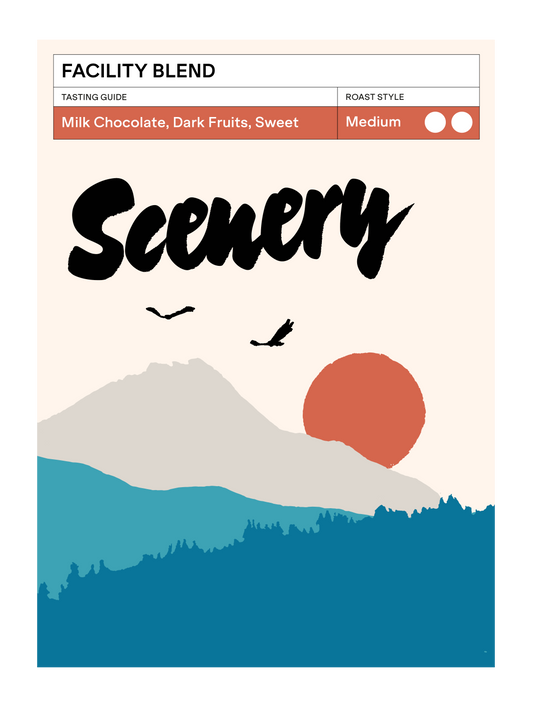Wilton's coffee was a single 24kg Vac Box lot, with the majority roasted on 06/03/24 with one final batch prior to LCF on 10/04/24
We’re releasing a very short and exclusive run of this world class, competition grade Orange Gesha from the talented Señor Benitez.
Having sourced it for use in the United Kingdom Barista Championship (many thanks to import partner MiCafe), our co-founder Alex unfortunately had to pull out of the semi-finals round. This means we have a slightly larger amount of this high technical intervention coffee available - please note, the roast date for this coffee is 06/03/24 as these batches were roasted for competition.
Brew Guide:
Best Brewed with: Filter
We’re releasing this coffee with a lighter profile more suited for filter, aiming to highlight both the bright acidity and crazy aromatics.
For Filter: We recommend a ratio of 55g/L if you want to see the full range of flavour that this coffee can express, whereas 60g per litre trends more syrup and complex. 96c water, the softer the better
For Espresso: 18g in, 45-50g out, 24-28s - a turbo style shot will suit this profile more, but expect a bright cup
We’re tasting: Dense floral aromatics of honeysuckle and lavender. The cup is multifaceted with a principle top note of passionfruit and mango, a mid-note of strawberries & cream, with a finish that reminds us of mandarin curd. Very, very sweet
Traceability:
Country of Origin: |
Colombia |
Region: |
Piendamó, Cauca |
Farm: |
Granja Paraíso 92 |
Producer: |
Wilton Benitez |
Variety: |
Orange Gesha |
Elevation: |
1800 MASL |
Process: |
“Advanced” Washed / High Intervention Precision Ferment: |
Import Partner: |
MiCafe |
Harvest |
Crop 24/25 - Harvested Jan 2024, Arrived UK: Feb 2024 |
The Story
In recent years, we've witnessed a fascinating divergence within the specialty coffee industry. Highly technical, interventionist processing methods are reshaping the landscape, creating coffees with flavour profiles that are radically different from traditional offerings. This shift is driving a market segmentation - these experimental lots command premium prices and attention.
Wilton Benitez is a producer at the cutting edge of this movement. With a family background in coffee production and a personal career history as a chemical engineer, he brought these two strands of his life together with the acquisition of Granja Paraíso 92 in 2015. Taking cues from the precise and well understood fermentation techniques found in more mature food & beverage industries (such as wine and beer) he embarked on a research and development effort to finesse these techniques for coffee processing.
It’s no secret that Colombia is a powerhouse for incredible coffee production. The climate allows for year long harvesting (while it used to be split into “main” and “mitaca/fly” crops, climate change has blurred this into year round picking), the government supports the coffee industry, and producers broadly have the resources to wet mill their own coffee, and the export market is incredibly competitive.There are very little restriction on planting new cultivars, and there are many unique microclimates across the country which suit these different cultivars to provide an incredibly broad spectrum of flavour profiles.
But when you have such a bountiful and complex environment to produce top grade coffees - competition arises to stand out, to differentiate and capture market share. When you combine speciality pricing and the increased return of value for higher quality coffees, the end result has been paradigm shifting advances in processing and cultivar development as producers look to diversify and stand out. It’s coffee - but not as we knew it.
Wilton owns and manages three diverse coffee farms in Piendamo – Cauca, Southwestern Colombia: La Macarena (75 hectares), Las Brisas (22 hectares), and Granja Paraíso 92 (5 hectares). Granja Paraiso 92 is where Wilton's processing centre is based. He grows over 26 different varieties in the 3 farms, and every step from seedling to export is tightly controlled to maximise quality.
The processing centre at Granja Paraíso 92 has a microbiology lab in which both specific yeast and lactobacillus strains are isolated and cultured, alongside commercially produced strains from other F&B industries. Processing occurs inside stainless steel bioreactors (fermentation vessels that allow for both monitoring and active control of fermentation conditions such as oxygen presence, temperature, agitation, etc), and typically involves sterilisation of cherry prior to inoculation. Coffee cherries are naturally laden with surface yeasts and lactobacillus that would otherwise dominate the initial fermentation, so via sterilisation prior to fermentation allows the resulting cup profile to be entirely driven by the metabolites of the specific strain of microbe being used.
A signature part of Wilton’s processing is of the “thermal shock” technique - using both very hot water soaks immediately following fermentation (90°C+) which acts as a kill step to finalise the process, followed by very cold water rinses (5°C or below). The claim associated with these temperature shocks is that the pores of the cherry/parchment/seed are opened or closed depending on the temperature used, allowing for the transport rate of volatiles and metabolites into the seed to be modified (either increasing the uptake, or sealing them in).
Drying is conducted under closed conditions in mechanical driers.
For this particular lot, Wilton used Pichia kluyveri yeast as his inoculation. P. kluyveri is a species naturally found in grape skins among other fruits, and has been found to produce high concentrations of the aromatic molecules associated with tropical fruits - in particular, passionfruit. Unlike the brewers yeast strains (S. cerevisiae) it cannot tolerate high alcohol content, and was not commercially cultivated for beverage production until recently, as it has gained recognition for the pleasant profile of its fermentation.

![[11] Colombia - Wilton Benitez Orange Gesha [CROP 23/24 ARCHIVE]](http://scenery.coffee/cdn/shop/articles/colombia_wilton_gesha.png?v=1714047877&width=1100)




![Mexico - Electrónicas Mazateca [25/26]](http://scenery.coffee/cdn/shop/files/mexico_electronicas_2526_shopify.png?v=1767970714&width=533)



![Colombia - Quebraditas Sidra Thermal Shock Washed [25/26]](http://scenery.coffee/cdn/shop/files/colombia_quebraditas_sidra_2526_shopify.png?v=1765544630&width=533)


![Colombia - Luz Ángela's Chiroso [25/26]](http://scenery.coffee/cdn/shop/files/colombia_luz_angela_chiroso_2526_shopify.png?v=1764359755&width=533)
